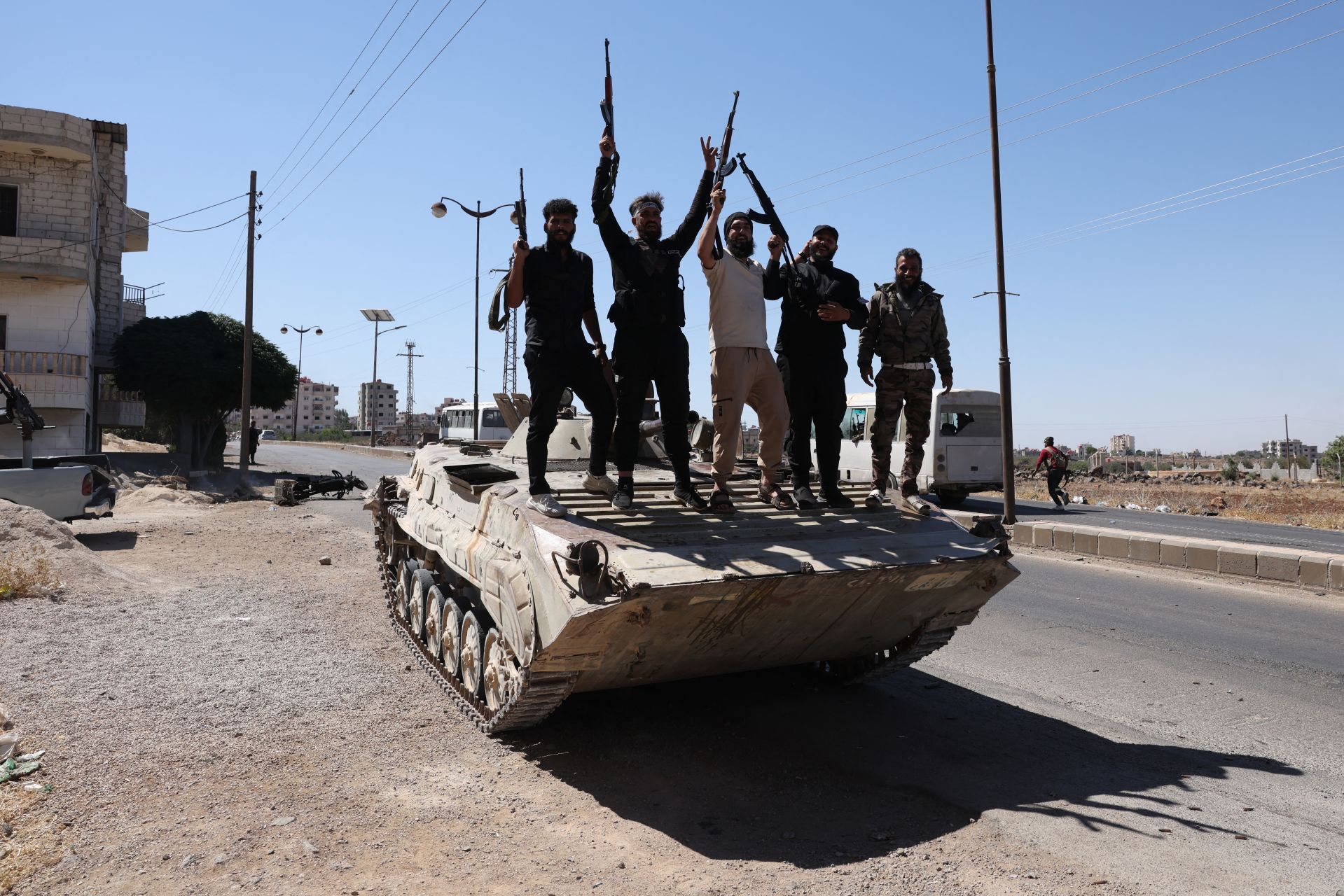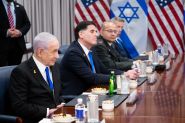- Home
- Middle East
- Syrian Forces Accused of 'Executions' in Druze Area as Israel Launches Strikes

Syria's security forces stand on a tank in the predominantly Druze city of Sweida on July 15, 2025, following clashes between Bedouin tribes and Druze fighters. Syrian government forces entered the majority Druze city of Sweida on July 15, 2025, the interior ministry said, aiming to end clashes with Bedouin tribes that have killed nearly 100 people. ©Bakr Alkasem / AFP
Syrian authorities were accused on Tuesday of carrying out summary executions of civilians in the predominantly Druze province of Sweida, where Israel said it had launched strikes against government forces in defense of the religious minority.
Damascus deployed troops to the area after clashes between Druze fighters and Bedouin tribes killed scores of people, with Syria's defense minister declaring a ceasefire Tuesday in Sweida city, which government forces entered in the morning.
Residents, however, told AFP the announcement had little discernible effect on the ground, accusing government troops and their allies of rampaging through Druze neighborhoods.
The interior ministry acknowledged clashes had continued into the evening.
The Syrian Observatory for Human Rights said Tuesday that Syrian government forces and their allies had executed 21 Druze civilians in and around Sweida.
They were among at least 203 people killed in the violence since early Sunday, including 93 members of the security forces, 71 other Druze and 18 Bedouin, according to the war monitor.
Forces from the "defense and interior ministries carried out field executions of 12 civilians after storming the Radwan family guest house in the city of Sweida," the Observatory said earlier.
Armed groups affiliated with the government were also responsible for gunning down three siblings in front of their mother in Sweida province, according to the monitor.
Rayan Maarouf, editor-in-chief of the Suwayda 24 news website, said security forces had engaged in "savage practices," adding there had been reports of civilians killed, "dozens of them... but we don't have precise figures."
Israeli Strikes
While most Druze religious leaders had earlier said they supported the government's deployment after the clashes with the Bedouin, at least one senior figure urged armed resistance, having previously called for "international protection."
Neighboring Israel, which has its own Druze minority, has sought to portray itself as a defender of the community while also warning the Syrian government against maintaining any military presence south of Damascus, which Israel considers a security threat.
Prime Minister Benjamin Netanyahu and Defense Minister Israel Katz announced strikes Tuesday on "regime forces and weaponry" that they said were intended for use against the Druze.
"We are acting to prevent the Syrian regime from harming them and to ensure the demilitarization of the area adjacent to our border with Syria," the pair said in a joint statement.
Shortly after, the Israeli military said it had begun hitting military vehicles in the area. Syrian state media also reported strikes.
Syria's Islamist-led government, which on Saturday sent an emissary to Azerbaijan for a first face-to-face meeting with an Israeli official, condemned "in the strongest terms the treacherous Israeli aggression" and warned it had the right to defend itself.
The attacks killed a number of security personnel, the foreign ministry said, as well as "several innocent civilians."
US special envoy Tom Barrack, whose government is closely allied with Israel and has been trying to reboot its relationship with Syria, called the violence "worrisome."
Washington was seeking "a peaceful, inclusive outcome for Druze, Bedouin tribes, the Syrian government and Israeli forces," he added.
'Complete Ceasefire'
Defense Minister Murhaf Abu Qasra declared just before midday (0900 GMT) Tuesday "a complete ceasefire" in Sweida city after talks with local representatives.
Druze representatives, meanwhile, gathered at the residence of key leader Sheikh Youssef Jarbouh to discuss implementing the ceasefire, a source close to the participants said.
But on Tuesday evening, the interior ministry said, "clashes are still ongoing in some neighborhoods," adding efforts were underway "to fully restore control."
Earlier understandings reached with local representatives, it added, "were soon violated as the armed outlaw groups resumed attacks, targeting police and security personnel."
A curfew was to be imposed in a bid to halt the violence, which erupted between Druze and Bedouin fighters at the weekend and has since spread across Sweida province.
Government forces said they intervened to separate the two sides, but they ended up taking control of several Druze areas around Sweida, an AFP correspondent reported.
'Not Against the State'
The Observatory, Druze leaders and witnesses said the government troops had entered the city accompanied by Bedouin fighters and joined with them in attacking the Druze.
An AFP correspondent who entered Sweida shortly after the troops reported dead bodies lying on deserted streets and sporadic gunfire.
"I'm in the centre of Sweida. There are executions, houses and shops that have been torched, and robberies and looting," one Sweida resident holed up in his home told AFP by phone.
The situation echoes past instances of sectarian violence and underscores the security challenges facing interim leader Ahmad al-Sharaa since his forces ousted longtime ruler Bashar al-Assad in December after nearly 14 years of civil war.
Amal, a 46-year-old resident, said she feared a repeat of massacres in Syria's northwest in March that saw more than 1,700 mostly Alawite civilians killed, allegedly by groups affiliated with the government.
"We are not against the state, but we are against surrendering our weapons without a state that treats everyone the same," she said.
AFP
Read more



Comments